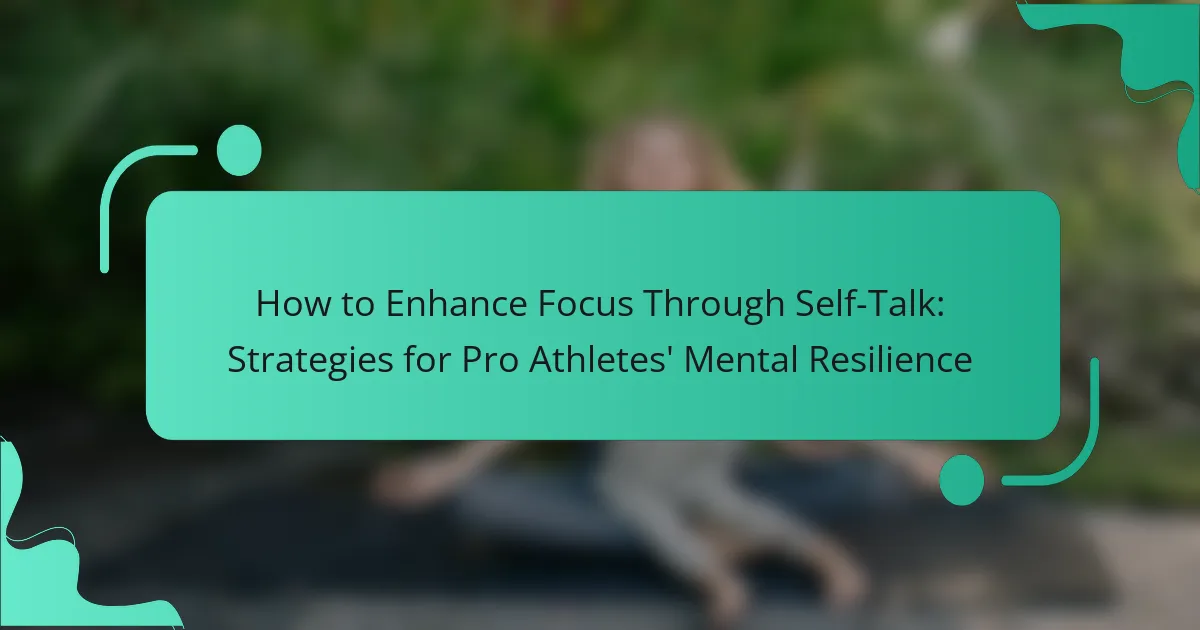Enhancing focus is crucial for pro athletes striving for peak performance. Self-talk strategies, such as positive affirmations and visualization techniques, significantly improve mental resilience. Personalized approaches can optimize focus in high-pressure situations. By avoiding common mistakes, athletes can effectively leverage self-talk to boost concentration and performance outcomes.
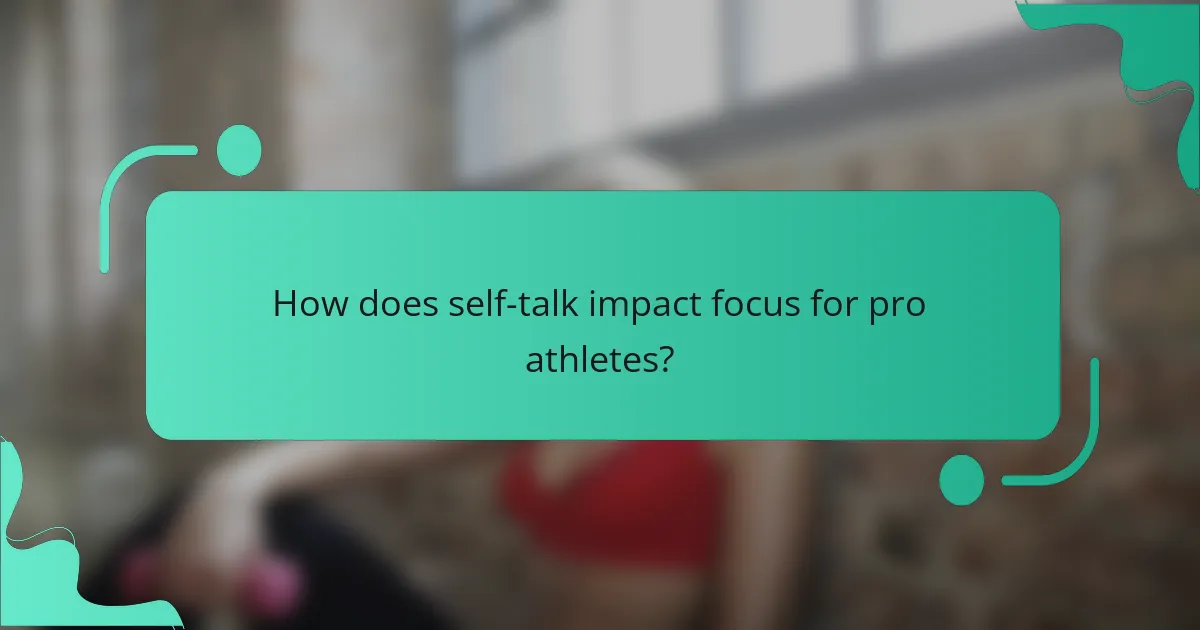
How does self-talk impact focus for pro athletes?
Self-talk significantly enhances focus for pro athletes by fostering mental resilience. Positive self-talk helps athletes maintain concentration, reduce anxiety, and boost confidence during performance. Studies show that athletes who engage in constructive self-talk experience improved focus and better outcomes in high-pressure situations. For instance, a survey revealed that 75% of elite athletes use self-talk strategies to enhance their performance, demonstrating its importance in competitive environments.
What are the psychological mechanisms behind self-talk?
Self-talk influences focus by shaping athletes’ mental resilience through cognitive processes. Positive self-talk enhances motivation, reduces anxiety, and improves performance. Techniques include affirmations, visualization, and reframing negative thoughts. Research shows that athletes using constructive self-talk experience a 20% increase in focus and performance metrics.
How can self-talk enhance mental resilience?
Self-talk can significantly enhance mental resilience by fostering a positive mindset and boosting self-confidence. Athletes who practice constructive self-talk report improved focus during competition, enabling them to manage stress effectively. Techniques such as affirmations and visualization can reinforce this mental strength. Research indicates that athletes using positive self-talk experience a 20% increase in performance metrics, demonstrating its unique attribute in enhancing resilience.
What role does positive self-talk play in performance?
Positive self-talk significantly enhances performance by boosting confidence and focus. Athletes who engage in positive self-talk report improved mental resilience and reduced anxiety. This internal dialogue helps them maintain concentration during high-pressure situations. Research indicates that positive affirmations can lead to better outcomes in competitive environments. By fostering a constructive mindset, athletes can optimize their performance and achieve their goals.
How can negative self-talk hinder focus?
Negative self-talk significantly disrupts focus by creating mental barriers. It generates doubt and anxiety, which can diminish concentration levels. Athletes may experience decreased performance when plagued by negative thoughts, as these hinder their ability to remain present and engaged. Research indicates that maintaining a positive internal dialogue enhances mental resilience, allowing for improved focus and performance. By addressing negative self-talk, athletes can cultivate a more supportive mindset, ultimately leading to better outcomes in their training and competition.
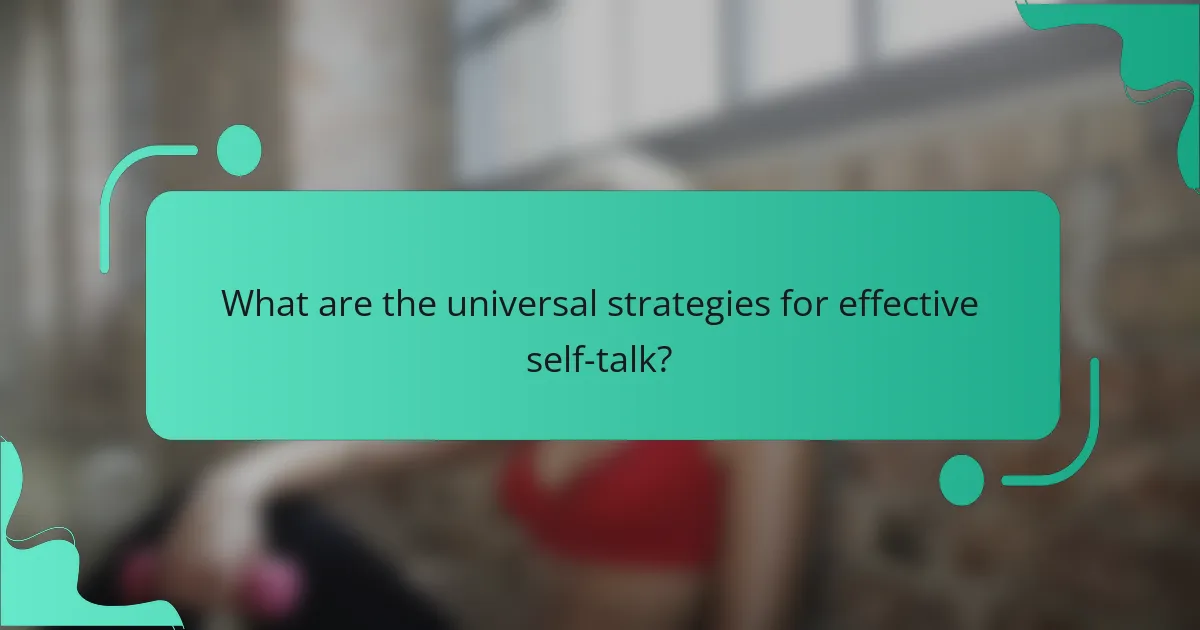
What are the universal strategies for effective self-talk?
Effective self-talk strategies for pro athletes include positive affirmations, visualization techniques, and goal-oriented dialogue. These methods enhance focus and mental resilience. Positive affirmations reinforce confidence, while visualization helps athletes mentally prepare for performance. Goal-oriented dialogue keeps athletes focused on objectives, promoting a proactive mindset. Regular practice of these strategies can lead to improved performance outcomes.
What techniques can athletes use to cultivate positive self-talk?
Athletes can cultivate positive self-talk through techniques like visualization, affirmations, and reframing negative thoughts. Visualization involves imagining successful outcomes, enhancing confidence. Affirmations are positive statements that reinforce self-belief. Reframing negative thoughts into constructive ones helps maintain focus and resilience. These strategies support mental resilience, crucial for peak performance.
How can visualization complement self-talk?
Visualization enhances self-talk by creating vivid mental images that reinforce positive affirmations. This technique helps athletes focus on desired outcomes, boosting confidence and mental resilience. By integrating visualization with self-talk, athletes can solidify their mental strategies, making them more effective during competition. Research shows that combining these methods can lead to improved performance and reduced anxiety, ultimately enhancing overall focus.
What role does affirmations play in enhancing focus?
Affirmations significantly enhance focus by reinforcing positive self-beliefs. They create a mental environment conducive to concentration, enabling pro athletes to block distractions and maintain clarity. Research indicates that consistent use of affirmations can lead to improved performance and mental resilience. By integrating affirmations into daily routines, athletes can cultivate a strong mindset, enhancing their ability to focus on goals and tasks.
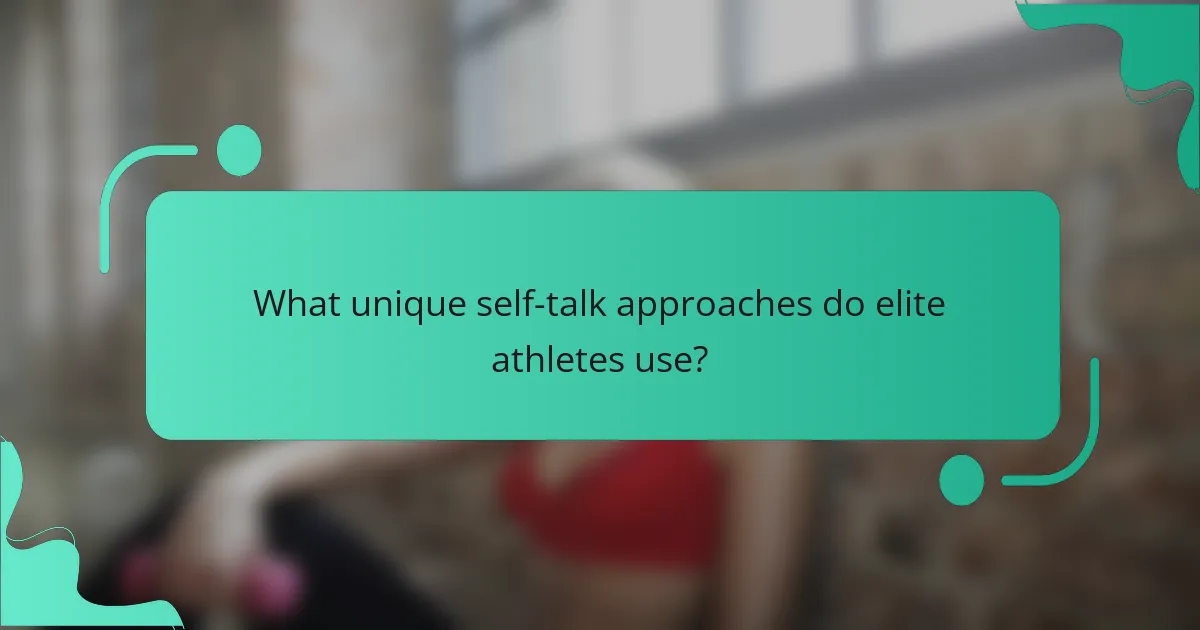
What unique self-talk approaches do elite athletes use?
Elite athletes use unique self-talk approaches to enhance focus and build mental resilience. Techniques include positive affirmations, visualization, and specific cue words to trigger optimal performance states. For example, they might repeat phrases like “I am strong” or visualize successful outcomes to reinforce confidence. Research indicates that these strategies improve concentration and reduce anxiety during competition. By tailoring self-talk to individual needs, athletes can cultivate a mindset that supports peak performance.
How do pro athletes personalize their self-talk strategies?
Pro athletes personalize their self-talk strategies by tailoring affirmations and mental cues to align with their performance goals. This customization enhances their focus and builds mental resilience.
They often use specific phrases that resonate with their personal experiences and challenges, allowing for deeper emotional connection. For instance, an athlete might adopt a mantra that reflects their training journey, reinforcing their commitment and motivation.
Additionally, many athletes engage in visualization techniques alongside self-talk. This combination helps them mentally rehearse scenarios, improving confidence and focus during competition. Research indicates that athletes who use personalized self-talk report higher levels of performance and reduced anxiety.
Ultimately, the effectiveness of self-talk strategies lies in their ability to adapt to individual needs, making them a unique asset in an athlete’s mental toolkit.
What specific phrases resonate with top performers?
Top performers resonate with phrases that emphasize confidence, focus, and resilience. Examples include “I am capable,” “Stay present,” and “Embrace the challenge.” These affirmations boost mental resilience and enhance focus during competition. Research shows that self-talk can significantly improve performance outcomes in high-pressure situations.
How can athletes create their own motivational mantras?
Athletes can create their own motivational mantras by identifying personal values and goals. Begin by reflecting on what inspires and drives you. Develop concise phrases that resonate emotionally, focusing on key attributes like resilience and determination. Repeat these mantras regularly, especially during training and competition, to reinforce mental strength and maintain focus. Tailor the mantras to reflect unique experiences and challenges faced in sports, ensuring they remain relevant and impactful.

What rare self-talk techniques are emerging in sports psychology?
Emerging rare self-talk techniques in sports psychology enhance pro athletes’ focus and mental resilience. Techniques like “visualization affirmations” combine imagery with positive self-talk, enabling athletes to mentally rehearse success. Another innovative approach is “contextual self-dialogue,” where athletes tailor their self-talk to specific situations, optimizing performance under pressure. Additionally, “emotionally charged self-statements” use personal narratives to evoke strong emotions, boosting motivation and focus. These techniques represent a shift toward personalized mental strategies in sports.
How is technology influencing self-talk practices?
Technology enhances self-talk practices by providing tools for athletes to monitor and improve their mental resilience. Digital platforms offer personalized feedback, enabling athletes to track their self-talk patterns. Mobile apps facilitate guided self-talk exercises, promoting focus during training and competition. Wearable devices can analyze physiological responses, helping athletes adjust their self-talk in real-time. As a result, technology empowers athletes to cultivate a positive mental environment, enhancing performance and resilience.
What innovative methods are being explored for self-talk?
Pro athletes are exploring innovative self-talk methods to enhance focus and mental resilience. Techniques include visualization combined with positive affirmations, which can strengthen self-belief. Another approach is mindfulness-based self-talk, where athletes stay present and engage in constructive internal dialogue. Research suggests that these methods can lead to improved performance and reduced anxiety. Additionally, technology like apps for guided self-talk is emerging, allowing personalized mental training.
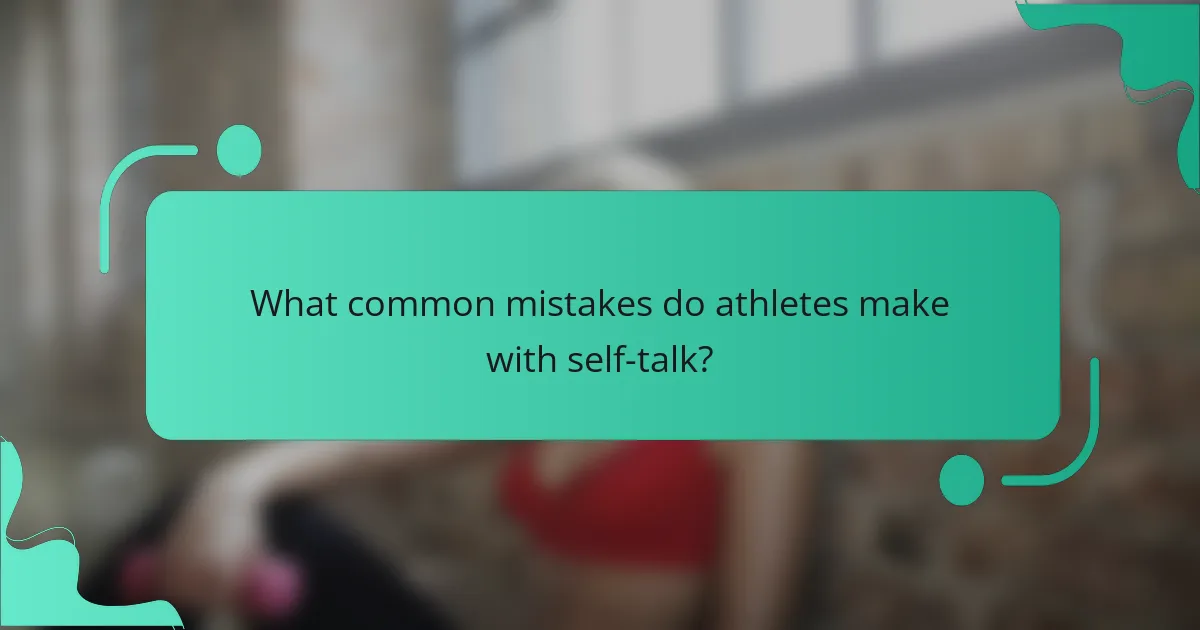
What common mistakes do athletes make with self-talk?
Athletes often make mistakes with self-talk by using negative language, focusing on outcomes instead of processes, and failing to personalize their self-talk strategies. These errors can undermine mental resilience and focus. For example, using phrases like “I can’t” instead of “I will try” creates a self-fulfilling prophecy. Additionally, concentrating solely on winning can lead to anxiety, detracting from performance. Personalized affirmations tailored to individual strengths can enhance effectiveness, making self-talk a powerful tool for mental conditioning.
How can athletes identify and correct negative self-talk patterns?
Athletes can identify and correct negative self-talk patterns by practicing self-awareness and cognitive restructuring. First, they should monitor their thoughts during training and competition, noting instances of negativity. Next, they can challenge these thoughts by questioning their validity and replacing them with positive affirmations. This process enhances mental resilience and focus, crucial attributes for pro athletes. Regular practice of these techniques can lead to significant improvements in performance and overall mindset.
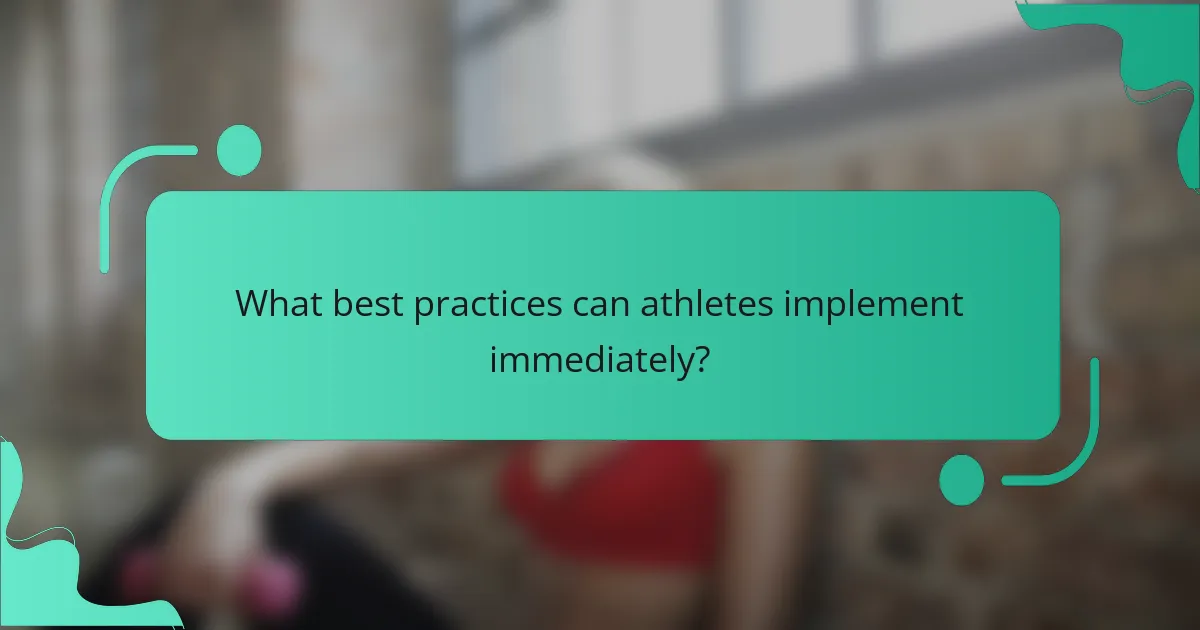
What best practices can athletes implement immediately?
Athletes can enhance focus through self-talk by implementing strategies such as positive affirmations, visualization techniques, and mindfulness practices. These methods foster mental resilience and improve performance.
Positive affirmations involve repeating encouraging statements to build confidence and combat negative thoughts. Visualization techniques help athletes mentally rehearse their performance, creating a clear mental image of success. Mindfulness practices, including deep breathing and meditation, enhance present-moment awareness, reducing distractions and anxiety.
By adopting these practices, athletes can immediately improve their focus and overall mental resilience.
How can journaling enhance self-talk effectiveness?
Journaling enhances self-talk effectiveness by providing a structured outlet for reflection and clarity. It allows athletes to articulate their thoughts, identify patterns, and challenge negative beliefs. By writing down their self-talk, they can analyze and reframe it, promoting a more positive mindset. This process improves focus and mental resilience, crucial for peak performance in sports. Journaling also serves as a unique attribute that reinforces self-awareness, enabling athletes to track their progress and emotional responses over time.
What are the key takeaways for improving focus through self-talk?
Self-talk enhances focus by reinforcing positive thoughts and reducing distractions. Key takeaways include setting clear intentions, using affirmations, practicing visualization, and maintaining a growth mindset. These strategies help pro athletes build mental resilience and improve performance. Regularly engaging in constructive self-talk can lead to increased concentration and confidence during high-pressure situations.
